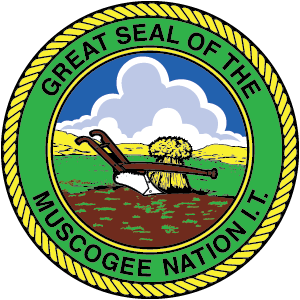Muscogee (Creek) Nation files lawsuit against opioid manufacturers, pharmacies, distributors
FOR IMMEDIATE RELEASE
Tuesday, April 3, 2018
MEDIA CONTACT
Neely Tsoodle
918-758-6599 (c)
MUSCOGEE (CREEK) NATION FILES LAWSUIT AGAINST OPIOID MANUFACTURERS, PHARMACIES, DISTRIBUTORS
Lawsuit to hold Purdue Pharma, Endo, McKesson, Cardinal Health, AmerisourceBergen, CVS Health and Walgreens accountable for fueling opioid crisis
Okmulgee, Okla.—Today, the Muscogee (Creek) Nation filed a lawsuit against the opioid manufacturers Purdue Pharma L.P., Purdue Pharma Inc., The Purdue Frederick Company, and Endo Health Solutions Inc., as well as distributors McKesson Corporation, Cardinal Health, Inc. and AmerisourceBergen Corporation, and pharmacies CVS Health Corporation, Walgreens Boots Alliance, Inc. and Wal-Mart Stores, Inc. The defendants failed to prevent the flow of illicit opioids into the Muscogee (Creek) Nation.
The Muscogee (Creek) Nation – one of the largest federally recognized Native American tribes in the United States with a membership of 83,570 citizens – lawsuit is the latest filed by Native American tribes across the country – who acutely feel the impact of the opioid crisis. Opioid addiction has led to the death of thousands of tribal citizens and countless suffering for those addicted to these drugs. Families have been ripped apart as addicted parents become unable to care for their children, impairing the ability of tribal communities to pass on their traditions to the next generations. This crisis threatens the very existence of some Native American tribes.
The Muscogee (Creek) Nation covers 4,867 square miles in Oklahoma— a state which leads the country in opioid abuse. In recent years, it the state ranked number one nationally for the nonmedical use of prescription opioids for adults, and it currently ranks number five for drug overdose deaths. From 2007 to 2012, more overdose deaths in Oklahoma involved hydrocodone or oxycodone than alcohol, cocaine, methamphetamine, heroin, and all other illegal drugs combined. Between 2014 and 2016, 2,315 people died of drug overdoses in Oklahoma largely fueled by prescription and illicit opioids.
“Our communities simply do not have enough families to accept all of the children who are born addicted or whose addicted parents are no longer able to care for them,” said Muscogee (Creek) Nation Principal Chief James Floyd. “We run the risk of losing children from the tribe forever when they must be placed in custody outside of tribal homes. This crisis also threatens our children and communities in other ways—every dollar that is spent addressing the opioid crisis is a dollar that cannot be spent on other pressing healthcare needs, education, and economic development.”
“The defendants’ misconduct, and failure to comply with their legal obligations, has led to an epidemic of prescription opioid abuse,” said Muscogee (Creek) Nation Attorney General Kevin Dellinger. “In order to protect the health, safety, and welfare of all our citizens, we seek to hold these companies accountable for their negligence and wrongdoing within the Muscogee (Creek) Nation.”
Manufacturing and selling opioids is highly regulated by the Drug Enforcement Administration. Since bringing prescription opioids to the market, manufacturers have falsely represented the risk of using the drugs to treat chronic pain, a clear violation of their legal responsibility through extensive marketing campaigns. Pharmacies and opioid distributors, under federal law, have a responsibility to alert regulators of suspicious orders and illegitimate prescriptions. When suspicious orders are filled, highly dangerous controlled substances are diverted into the hands of unauthorized users and the illegal black market, fueling the opioid epidemic.
The Muscogee (Creek) Nation is represented by special counsel Richard Fields of Fields PLLC, Scott Gilbert and Richard Shore of Gilbert LLP, and Native American law specialists Sonosky Chambers partners Lloyd Miller and Don Simon.
“Native Americans have suffered extraordinary and disproportionate harm because of the opioid crisis,” said Fields. “Their death rate is higher than any other population group, their addiction rate is 64 percent higher than the national average, and many tribes pay a far higher proportion of their citizens’ health care costs than other governments.”
The full complaint, which was filed in U.S. District Court for the Northern District of Oklahoma, can be viewed here.
###




